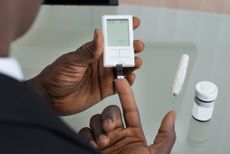
Diabetic retinopathy is a complication of diabetes that damages the blood vessels in the back of the eye. The condition is a leading cause of blindness in American adults. Below, learn more about diabetic retinopathy's causes and stages, as well as some prevention tips and ways an eye doctor can help.
Causes
Uncontrolled blood sugar blocks the tiny blood vessels that nourish the retina, the lining at the back of the eye that converts light into an image. As a result, the eye will attempt to develop new blood vessels, but a lack of nourishment will make these new vessels weak and ineffective. They will be prone to bleeding, leaking, and swelling, which can jeopardize your eyesight. Anyone with Type 1 or Type 2 diabetes can develop diabetic retinopathy, and their risk increases the longer their blood sugar is uncontrolled.
Stages
There are four stages of diabetic retinopathy, with the first, which is called mild nonproliferative retinopathy, marked by small swellings of the blood vessels and fluid-leaks onto the retina. In the second, moderate nonproliferative retinopathy, blood vessels swell more pronouncedly and change shape, preventing blood from getting to the retina.
During the third stage, severe nonproliferative retinopathy, the blood vessels become completely blocked, and the retina tries to grow new vessels. In the final stage, known as proliferative diabetic retinopathy, the delicate new blood vessels grow abnormally and frequently bleed and leak, which can also cause the retina to detach, resulting in blindness.
Symptoms at each stage include worsening vision, which includes spots, floaters, the inability to see colors, and dark patches or holes. These symptoms grow more prominent and serious as the disease progresses.
Prevention & Treatment
Manage your diabetes by taking medications as prescribed by your doctor, exercising at least 150 minutes every week, and eating healthily. Monitor your blood sugar level, and, if your blood pressure and cholesterol can't be controlled through diet and exercise, consider medications that can help. If you smoke, make plans to quit.
While there is no cure for diabetic retinopathy, an eye doctor can perform several different procedures to alleviate symptoms. These include injections of drugs that prevent the growth of abnormal blood vessels, laser surgery, and corticosteroids. Your eye doctor will form a treatment plan based on the stage of the illness and the symptoms you're experiencing.
Remember, your eye doctor is here to help, so you don't have to face diabetic retinopathy on your own. Comprehensive Eye Care, LTD. has been serving the Franklin County, MO, area since 1993. They offer a variety of eye care services and clinical trials that you can apply to be a part of (they have been doing them over 20 years) by calling or emailing the business. Call (636) 390-3999 or visit their website to schedule an appointment.
About the Business
Have a question? Ask the experts!
Send your question

